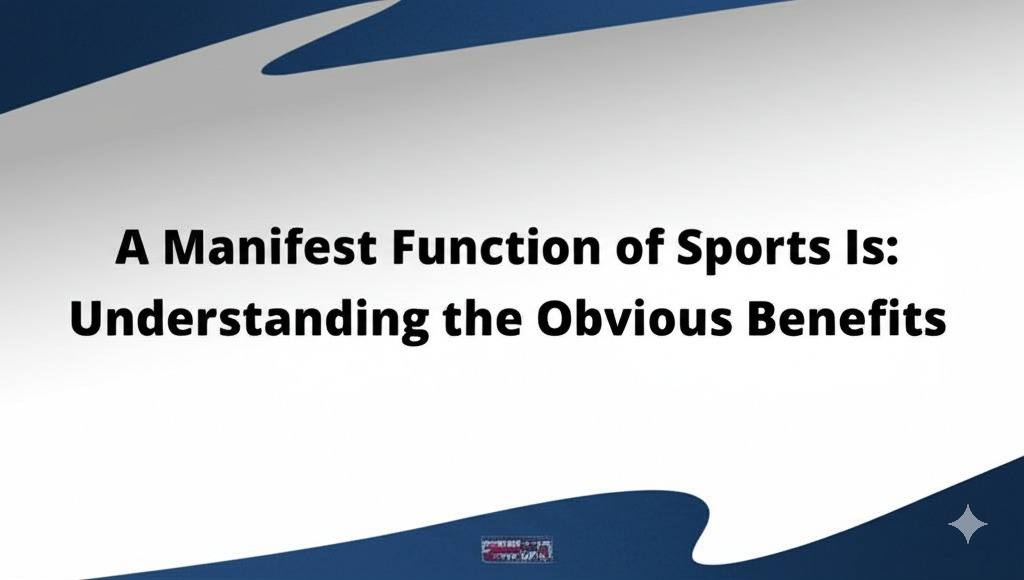Why do we love sports? Whether you’re a die-hard fan or just watch the Super Bowl for the commercials, sports hold a central place in societies around the world. But beyond entertainment and competition, sports serve clear, intentional purposes—known in sociology as “manifest functions.”
In this article, we’ll explore what a manifest function of sports is, why it matters, and how it shapes individuals and society in powerful, often overlooked ways.
What Is a Manifest Function?
In sociology, functions are the consequences of social actions or institutions. These functions are split into two categories:
- Manifest functions – the intended and recognized outcomes.
- Latent functions – the unintended or hidden consequences.
So, when we talk about a manifest function of sports, we’re referring to the deliberate and visible benefits that sports bring to society.
Major Manifest Functions of Sports
1. Physical Fitness and Health Promotion
One of the most obvious benefits of sports is improving physical health. From youth leagues to professional teams, the primary aim is often to encourage:
- Exercise and mobility
- Weight management
- Cardiovascular health
- Reduced risk of chronic illnesses
Schools, communities, and even governments invest in sports to promote a healthier, more active population. This is not a hidden benefit—it’s a central goal.
2. Social Integration and Community Building
Sports act as a powerful unifier across diverse groups. They help:
- Foster teamwork and cooperation
- Bridge cultural or racial divides
- Create shared experiences for communities
Whether it’s cheering for a hometown team or participating in a local league, sports strengthen social bonds and bring people together.
3. Character Development and Discipline
Especially in youth and educational settings, a key manifest function of sports is character education. Participation in sports helps individuals learn:
- Discipline
- Time management
- Goal setting
- Leadership and responsibility
These lessons extend far beyond the field and help shape productive, resilient members of society.
4. Entertainment and Economic Impact
Let’s not forget the role of sports in entertainment. Professional leagues like the NFL, NBA, and FIFA exist to provide engaging, high-stakes competition to a massive audience. This is a clear and intended function.
Moreover, sports have become a major industry, generating billions in:
- Ticket sales
- Advertising
- Media rights
- Merchandise
Cities and countries also benefit from tourism and job creation surrounding major sporting events like the Olympics or World Cup.
Sports in Education: A Clear Manifest Function
Why Schools Prioritize Sports
In schools and universities, sports are intentionally implemented to support:
- Student engagement
- School spirit and identity
- Scholarship opportunities
Many students pursue higher education thanks to sports scholarships, making athletics a direct pathway to academic and career advancement.
Building Future Leaders
Educational sports programs often emphasize leadership development, preparing young people to take on roles in:
- Business
- Politics
- Community leadership
- Coaching and mentoring
The Role of Sports in National Identity
Promoting Patriotism and National Unity
Sporting events can serve as a symbol of national pride. Think of the World Cup or the Olympics—where athletes represent their countries on a global stage.
These events:
- Encourage unity and patriotism
- Offer international visibility
- Showcase national talent and culture
Governments often fund elite training programs not just for athletic success, but to enhance national prestige—a crystal-clear manifest function.
Manifest Functions vs. Latent Functions of Sports
It’s important to distinguish between what sports are intended to do and the unintended side effects. Here’s a quick comparison:
| Manifest Functions | Latent Functions |
|---|---|
| Promote health and fitness | Reduce healthcare costs |
| Foster teamwork and discipline | Delay entry into the workforce |
| Unite communities | Create rivalries and tension |
| Boost national pride | Distract from political issues |
Understanding this difference helps us appreciate the purposeful role sports play in society.
Conclusion: Why Manifest Functions of Sports Matter
From promoting health to building communities and national identity, sports serve clear and crucial functions that shape our lives in visible ways. These manifest functions aren’t just societal side effects—they are the reason sports are celebrated, funded, and practiced worldwide.
So next time you watch a game or join a pickup match, remember: You’re not just enjoying a pastime—you’re participating in a powerful social institution with deep, deliberate impact.

Yara Bryant is a dedicated sports journalist with a knack for breaking down game strategies and delivering in-depth analysis. With a strong background in sports coverage, she specializes in football, basketball, and motorsports, bringing fans the latest news, insights, and predictions.


No responses yet